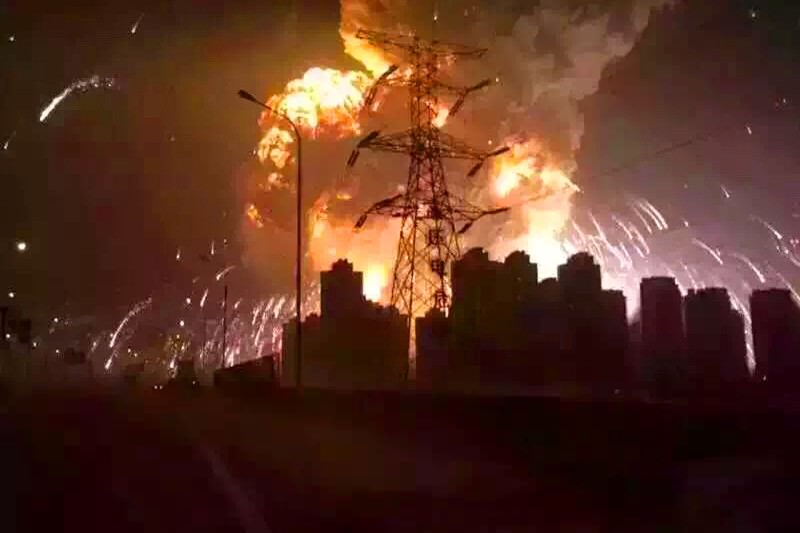
China's top workplace safety official was detained over corruption
allegations today being Tuesday 18th August 2015, nearly a week after fatal explosions in Tianjin
city, where he was a former senior official.
Yang Dongliang,
director of the State Administration of Work Safety, was suspected of
"severe violation of discipline and law", a Communist Party disciplinary
committee said, using a phrase often employed in corruption cases.
Yang
had long standing links to the chemicals industry and city government
in the north-eastern port city, where a fire and explosions on Wednesday
left at least 114 people dead.
Beijing earlier pledged to crack down on top officials connected to the disaster.
Yang's
career includes two years as deputy general manager of the United
Chemicals Company, as well as six years as vice mayor and five as senior
vice mayor of Tianjin.
China's cabinet, the State Council,
announced on Tuesday that an investigation would be led by the executive
vice minister of Public Security.
Ten top executives of the
private company at the centre of last week's massive chemical blasts
have also been detained, Chinese media reported on Tuesday.
Three
of them - Tianjin Dongjiang Port Ruihai International Logistics Company
president Li Liang, vice president Cao Haijun and chief financial
officer Song Qi - have been in detention since August 13, Caijing
financial magazine reported.
The four-year-old Tianjin company
started operating its hazardous chemicals warehouse before it obtained a
license, The Beijing News reported last week in a quickly deleted
article.
Ruihai was licensed to store a total of 10 tons of sodium
cyanide at the facility, Hong Kong's South China Morning Post reported.
The
company stashed 700 tons of the deadly chemical in wooden and metal
containers 600m from the nearest residential complex. There are also 20
residential compounds within a 3km-range, including a kindergarten,
Caijing reported.
Despite media reports that national regulations
require a minimum distance of 1km, an investigation by China News Weekly
concluded there was no such enforceable policy in practice.
The son of a former port city police chief is suspected of being a Ruihai shareholder, Caijing also reported.
The
magazine cited a police officer at the Tianjin port police saying
although Chief Dong Peijun died last year, his son Dong Mengmeng was a
company shareholder "for some time in the past".
'White powder'
There
were numerous social media reports of white powder in the air and white
foam on the ground after rain fell early on Tuesday, the first since
last week's explosions.
The Global Times reported white powder "everywhere" around the explosion site on its blog.
"After
the showers, there is white foam floating on the road," it said.
"Citizens say that there is this kind of white powder on their cars when
they are washing their cars."
"Meanwhile, people who work outside also have this similar white powder in their nostrils."
Many posts were quickly deleted from China's highly censored Twitter-like microblog service Weibo.
The official Beijing Times reported a "huge amount of abnormal white foam on the road" after the rain.
"Bao
Jingling, chief engineer of the environmental protection bureau, said
the best way is to get far away from polluted residue near the blast
point," the post said.
Ceremonies were held on Tuesday to mourn
those who died in the blasts. Firefighters, police, soldiers and
officials stood in silence with bowed heads in a traditional ceremony to
remember the dead.
Cargo ships sounded horns in respect at the world's 10th-busiest container port.
Seventy people are still missing, including 64 firefighters and five policemen, Xinhua news agency reported.
Officials
have assured the public that the air and water in and around the blast
zone still meets safety standards, six days after the blasts.
Specialists
cleared about 150 tons of dangerous chemicals scattered within a radius
of 3km around the blast site by Monday night, said Tianjin Deputy Mayor
He Shushan.
Large quantities of sodium cyanide were among the chemicals found around the blast area.
Sodium cyanide is highly toxic, and in contact with water releases hydrogen cyanide gas, which is toxic and flammable.
About
3 000 tons of hazardous chemicals were stored at the warehouse, Niu
Yueguang, deputy director of the fire department of the Public Security
Ministry told China Central Television. These included - in addition to
the reported 700 tons of sodium cyanide - 800 tons of ammonium nitrate
and 500 tons of potassium nitrate, both of which are used in fertilisers
and explosives.
Tuesday, August 18, 2015
China holds a top safety official over Tiajnin blasts
About iamwizdom
Author Description here.. Nulla sagittis convallis. Curabitur consequat. Quisque metus enim, venenatis fermentum, mollis in, porta et, nibh. Duis vulputate elit in elit. Mauris dictum libero id justo.
Subscribe to:
Post Comments (Atom)





























No comments:
Write comments